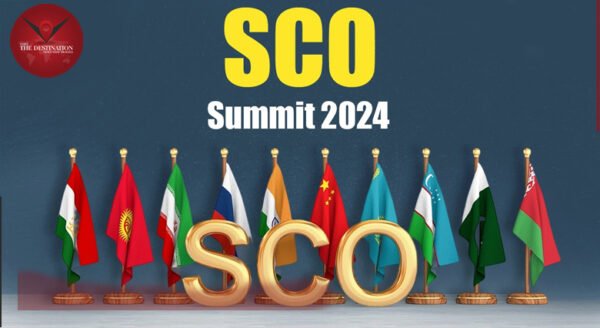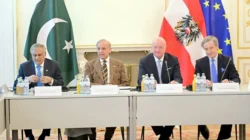PAKISTAN’S STRATEGIC OPPORTUNITY AT THE SCO SUMMIT 2024

Islamabad-(Hira Tahir): On October 15-16, Pakistan will host the Shanghai Cooperation Organization (SCO) Heads of Government Meeting, bringing together leaders from China, Russia and Central Asia, marking a pivotal moment in the country’s international diplomacy. Among the distinguished attendees are China’s Xi Jinping, Russia’s Vladimir Putin, India’s External Affairs Minister S. Jaishankar, and heads of government from Kazakhstan, Kyrgyzstan, Tajikistan, Uzbekistan, and Iran, who will take center stage as key speakers at the 2024 summit. This high-profile gathering provides Pakistan with an invaluable opportunity to demonstrate its commitment to international cooperation and enhance its global standing, potentially influencing the direction of the country’s future diplomatic and economic initiatives.
Established in 2001, the Shanghai Cooperation Organization (SCO) brings together eight key member states, including China, Russia, India, Pakistan, and the four Central Asian nations—Kazakhstan, Kyrgyzstan, Tajikistan, and Uzbekistan. With four observer states (Afghanistan, Belarus, Iran, and Mongolia) and a number of dialogue partners, the SCO has become a crucial forum for addressing regional security, economic integration, and political collaboration. As Pakistan grapples with economic and political challenges, the upcoming summit offers a significant opportunity for the country to engage with regional partners on its pressing concerns amidst a rapidly shifting and polarized geopolitical environment, explore collaborative solutions to its challenges, and demonstrate its capacity to engage in global diplomacy and manage high-level international discussions, aligning with its broader foreign policy aspirations.
Moreover, Pakistan’s historical role as a bridge between South and Central Asia, owing to its strategic geographic location, will be further emphasized at the upcoming SCO summit. The organization’s core areas of focus—security, economic development, and infrastructure—align closely with Pakistan’s national interests, particularly as it grapples with ongoing security and economic challenges. At a time of surging inflation and dwindling foreign reserves, Pakistan’s primary goal will be to strengthen economic ties within the region. China, through the China-Pakistan Economic Corridor (CPEC), remains a key economic partner, providing critical infrastructure investment. The summit offers Pakistan a valuable opportunity to not only expand CPEC but also attract investment from Central Asian states seeking access to the Arabian Sea through Pakistan’s ports, enhancing regional connectivity and cooperation.
The economic importance of the Shanghai Cooperation Organisation (SCO) is substantial, with its member states comprising nearly 40% of the global population and contributing approximately 25% of the world’s GDP. The region includes some of the world’s fastest-growing economies, such as China and India, alongside the resource-rich nations of Central Asia. For Pakistan, active participation in an organization of this scale is crucial for its economic development and security. As a country facing significant energy shortages, Pakistan stands to gain from enhanced cooperation within the SCO, particularly in areas like energy security, resource-sharing, and access to Central Asia’s abundant gas and oil reserves.
Additionally, the SCO’s increasing focus on regional trade and connectivity presents Pakistan with a valuable opportunity to diversify its economic partnerships. Strengthening energy ties with Russia, which began with the signing of a liquefied natural gas (LNG) deal earlier this year, could gain further traction during the summit.
Pakistan is actively seeking new alliances and platforms to expand its influence on the global stage. The SCO, with its leadership dominated by non-Western powers like China and Russia, is positioning itself as a counterbalance to Western-led organizations such as NATO and the G7. By aligning more closely with the SCO, Pakistan not only strengthens its role within the Global South but also gains an alternative avenue to advance its foreign policy outside the traditional Western frameworks. Pakistan has already expressed its ambition to become a thought leader and mediator within the Global South, and its active participation in the SCO highlights its potential to lead discussions on critical issues like regional cooperation, security, and counter-terrorism—topics of significant relevance to many developing nations.
Historically, Pakistan’s diplomatic identity has been shaped by its geopolitical position, longstanding relationships, and its role in international organizations such as the United Nations, the Organization of Islamic Cooperation (OIC), and the Commonwealth. However, its involvement in the Shanghai Cooperation Organization (SCO) presents a unique opportunity to promote a multi-faceted foreign policy that balances ties with China, Russia, the United States, and the European Union. The upcoming SCO summit could significantly enhance Pakistan’s global standing, allowing the country to portray itself as a responsible regional player, particularly in its ongoing efforts to combat terrorism and contribute to peacebuilding initiatives in South Asia and beyond.
In short, the forthcoming SCO summit in Islamabad signifies more than a mere gathering of regional leaders; it serves as a critical opportunity for Pakistan to reassess its position within the Global South and the broader international arena. Success hinges on Pakistan’s ability to navigate a foreign policy that harmonizes its established alliances with emerging partnerships within the SCO. As the organization expands in both demographic and economic clout, Pakistan must capitalize on its strategic location and potential for connectivity to enhance cooperation, security, and prosperity in the region. By embracing this approach, Pakistan can elevate its standing and establish itself as a proactive and responsible participant in the realm of global diplomacy.





